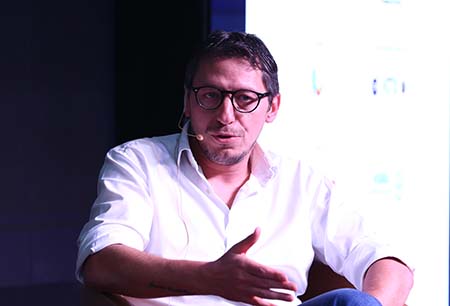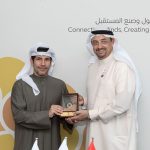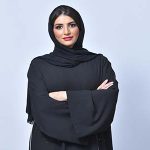Mohammad Saeed Al Shahi was appointed CEO of strategy, technology and executive affairs at Dubai Media Inc. in March 2012. In an exclusive interview with Vijaya Cherian, Al Shahi talks about his role at the media entity and the changes he has initiated to make the organisation more competitive in the broadcast space Congratulations on […]

Mohammad Saeed Al Shahi was appointed CEO of strategy, technology and executive affairs at Dubai Media Inc. in March 2012. In an exclusive interview with Vijaya Cherian, Al Shahi talks about his role at the media entity and the changes he has initiated to make the organisation more competitive in the broadcast space
Congratulations on your new role. I hear you have initiated several changes since you joined DMI?
Thank you. I was appointed by HRH Sheikh Maktoum bin Mohammed bin Rashid Al Maktoum, deputy ruler of Dubai and chairman of DMI to join the media entity. I joined in March and since my role is to oversee both the technical and the executive affairs of the entity, I have had to initiate several changes across the organisation.
The one that required immediate attention was our broadcast division. We required a more sound technical strategy than we have had in the past and the last three months have been spent designing a roadmap. We started to develop our strategy. Our objective is to migrate entirely to High Definition (HD) and a tapeless infrastructure by 2014 and we have started a few projects to achieve that. This is a huge chunk of what we will be doing.
We have also revisited our international distribution strategy and are looking to expand our reach into more markets as part of the direction from our chairman. As part of that, we are now broadcasting our channels on AsiaSat 5 as well. Besides that, we are available on Arabsat, Nilesat, Hotbird and Dish Network in America. We have also gone live with our HD channels on YahLive.
We believe the future is new media so we are looking at this more closely. We have a new media team that is about two years old and looks after social media and all digital media. We already have a presence on Twitter and Facebook but will look to see how we can be more active on that front. On the other side, we have web sites with live streaming and video-on-demand, where people can watch our programmes. We also have a mobile app for iPhones and Android devices. We are, however, looking at potential alliances that will enhance our initiatives in this area and we expect to announce something big in Q1 2013.
We are very optimistic that we will be able to ring in change and have put together an aggressive technical plan to ensure it all comes together within the time scales we have planned. Part of those efforts is to also hire people with new skills.
We are also mulling Digital TV and are in discussions with several parties in the region. On a parallel note, we are also looking to expand our radio network.
Besides this, we are collaborating with some international broadcasters on knowledge sharing through projects.
Our focus now is to ensure that we streamline our operations and work more efficiently while keeping our costs down, focus on new media, and expand our international distribution.
Any proud moments since you joined?
Yes indeed. I am very proud to say that we covered the dhow race, which goes on for around seven hours and heads almost 160 kms into the sea, entirely on our own. This is the first time in the last two decades that a local team from DMI has undertaken to cover this race from A to Z, as every year it has sourced people from the UK to come down and do it. We are going to capitalise on our inhouse resources more in the future.
DMIs creative team recently won around 20 programming awards, which is probably the largest number of awards a broadcaster has won at one given time.
We also launched six free-to-air sports channels solely for the Olympics. Every channel had a different feed highlighting different sporting events. This is the first time DMI has attempted this. We also had some live content coming in from London. Our Olympics web site included live updates, live videos and scores. Interestingly, we achieved this without incurring additional costs.
Tell us more about Dubai Media Incs broadcast strategy
Broadcast is about content and distributing this content but also building the right infrastructure to support the smooth flow of content from production through the different parts of the chain to multiple platforms, whether cable, satellite, mobile TV, connected TV or any other devices. We want to be everywhere. We are even looking at games now for the Xbox.
But DMI is a huge operation with so many legacy systems. We have looked at where we are today and where we want to be in the next two to three years. Thus far, we seem to have undertaken upgrades in isolation. Now, we need to have a more unified workflow so that all of our systems are talking to each other.
For that, we first looked at all of the projects we had at hand. We put those on hold that are not aligned with our overall technical strategy and have begun executing those that are part of our vision. Change cannot be wrought overnight. We have such a huge operation with so many studios, post production suites, transmission and OB vans. We are executing everything phase wise and hope to achieve this ambitious project within the next three years.
Phase 1 will hopefully be ready by Q1 2013. Then theres phase 2 and the final phase 3 is when we will achieve the overall goal of integrating all of our departments including the technical areas, the studios, the OB vans, post production and other operations.
Our goal is to eventually move all of DMIs TV channels to HD by 2014, restructure our transmission rooms to adopt tapeless technology and superior electronic archiving, extend our satellite broadcast footprint and create an advanced emergency transmission infrastructure.
What are some of the projects you have undertaken recently?
Our biggest news last month was the relaunch of the DMI news centre in Dubai Media City.
This has the largest floor space and is perhaps the biggest news centre in the entire Middle East.
It was inaugurated last month by His Highness Sheikh Mohammed bin Rashid Al Maktoum, vice president and prime minister of the UAE and ruler of Dubai.
We have also begun production at our new HD/3G studio. It is one of the largest studios in the region and was upgraded this summer by Qvest Media from SD to HD with full 3G support. Its a 1000 sqm studio with a state-of-the-art gallery that is equipped with eight Grass Valley 3G LDK 8000 world camera systems.
What is your biggest challenge in this new role?
Changing the mindset of the people is probably the toughest. We are trying to encourage people to adopt new ways. It has been tough but overall, I believe people have noticed a positive change and they are adapting to it.
What budget do you have to revamp your system?
We have never had an issue with budget. However, we are now looking to achieve a lot more with the same budget and be more accountable instead of incurring costs. Launching the Olympics channels and covering the Dhow race are examples of what we undertook without investing more money.
We are carefully working towards achieving our milestones. We are undertaking a transmission project. Previously, we used several different systems for transmission.
Our plan now is to move to one unified system so as to increase quality and efficiency.
My main goal in coming to DMI is to improve the quality of its products, bring in new ideas and reduce costs. I believe, with the right team and strategies, we are well placed to achieve that.















































































